Navigating social interactions in public can feel overwhelming for kids, especially those with autism. As parents, you play a vital role in helping your children develop the skills they need to thrive in these situations. In this article, we’ll explore ten effective ABA strategies that can boost social skills in public places, offering you valuable insights and practical techniques.
How can you turn everyday outings into opportunities for growth and confidence-building for your child? 🤔 The answers lie within these strategies, which promise a pathway to better social engagement and emotional resilience. Let’s dive in together and discover how to make these experiences more enjoyable for both you and your child!
At Rori Care, we understand that navigating the world of ABA therapy can feel overwhelming for parents. That’s why we’ve embraced a data-driven approach that not only enhances the efficiency of therapy but also integrates cutting-edge AI technology to automate progress report generation. This means our clinicians can spend 50% more time on direct treatment, ensuring that every young patient gets the personalized strategies they need to truly thrive.
Our skilled behavior analysts conduct thorough assessments to identify the unique challenges faced by kids with autism. This allows us to create focused interventions using ABA strategies for social skills in public places that promote effective interactions in public settings. It’s all about personalized care! Not only does this improve interpersonal skills, but it also nurtures emotional health, providing youngsters with essential ABA strategies for social skills in public places to navigate diverse communal environments with confidence.
Research shows that early and intensive ABA therapy can lead to remarkable improvements in communication and social skills. Programs offering 25 to 40 hours of therapy each week for 1 to 3 years have shown that 47% of individuals receiving ABA therapy become indistinguishable from their peers. By focusing on each child’s strengths and areas for growth, Rori Care empowers families to actively engage in their loved one’s development. This fosters informed decision-making and enhances behavioral outcomes.
Ultimately, our commitment to personalized planning, measurable objectives, and continuous assessment enriches the lives of youth with autism. We’re dedicated to promoting positive relational outcomes in their daily interactions. Let’s explore this journey together! We’re here to help you every step of the way!
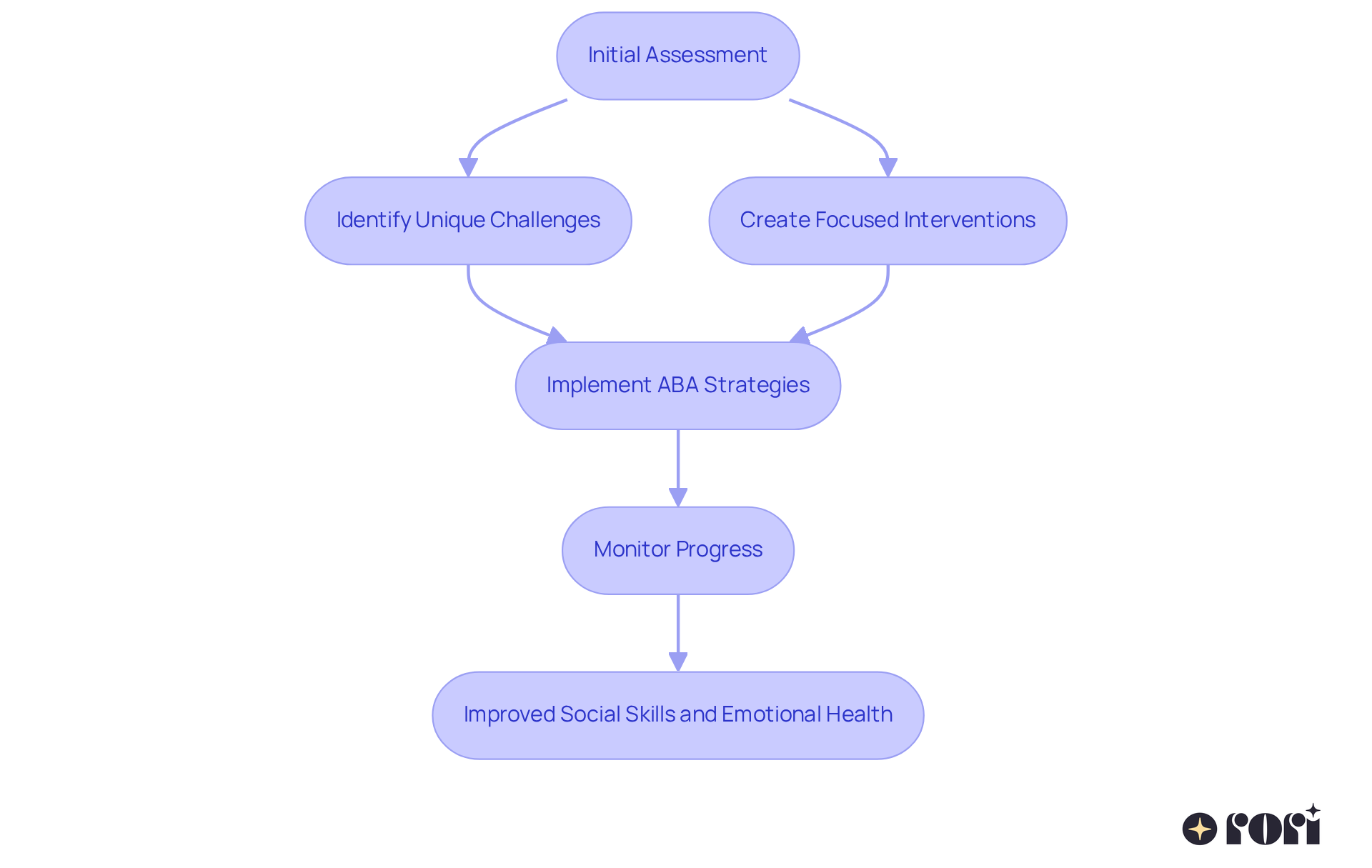
Modeling behavior is a fantastic way to teach kids how to interact with others. It lets them see and mimic the right responses in real-time. Parents can easily show important skills like greetings, sharing, and taking turns during everyday moments. For example, when meeting someone, parents can make eye contact and say hello, which helps their kids learn to do the same. This approach not only teaches social skills but also builds confidence in group settings, especially for kids with Autism Spectrum Disorders, ADHD, Social Communication Disorders, and Anxiety Disorders who might find these situations tricky.
Recent studies highlight just how much parental modeling impacts kids' interactions. Research shows that when kids see their parents engaging positively with others, they’re more likely to adopt those behaviors themselves. This kind of observational learning is crucial; it helps kids navigate social situations more smoothly. By consistently showing the behaviors they want to see, parents can create a nurturing environment that encourages their kids to practice and improve their social skills. This ultimately leads to better interactions in public spaces by utilizing ABA strategies for social skills in public places. Plus, when caregivers are empowered with ABA strategies for social skills in public places, they can offer even more support and make informed choices that positively influence their kids' behavioral goals. This leads to better outcomes and boosts confidence for both parents and their little ones.
Let’s explore this together! Your journey in fostering these skills can be rewarding, and we’re here to help you every step of the way!

Positive reinforcement is such a powerful tool! It’s all about giving immediate rewards or praise right after a desired behavior, which helps make that behavior more likely to happen again. For instance, when a little one shares a toy with a friend, offering some verbal praise or a small treat can really reinforce that positive action. Not only does this strengthen the behavior, but it also boosts the child’s confidence in social interactions, making them more eager to engage positively in the future.
Recent studies show that early and intensive ABA strategies for social skills in public places can significantly enhance social skills, language abilities, and emotional regulation in young kids. Plus, behavior analysts emphasize that consistently using positive reinforcement is one of the effective ABA strategies for social skills in public places, which can lead to big improvements in children’s social skills, creating an environment where they feel encouraged to connect and bond with others.
It’s super important for parents and caregivers to get involved in ABA therapy. Their participation ensures that the new skills learned are practiced regularly in everyday situations. By incorporating ABA strategies for social skills in public places into daily life, parents can play a crucial role in their child’s social development, ensuring that those new skills are practiced and reinforced in real-world contexts.
To keep track of progress, caregivers should consider maintaining a simple log of behaviors and rewards. This way, they can see improvements over time and tweak their strategies as needed. Educating caregivers enhances this process, giving them a better grasp of ABA principles and strategies, which helps them make informed decisions that positively impact their child’s growth.
Professionals delivering ABA therapy, like Board Certified Behavior Analysts (BCBAs) and Registered Behavior Technicians (RBTs), are trained to apply these strategies effectively. They ensure that interventions are based on solid evidence and tailored to each child’s unique needs. This collaborative approach not only empowers caregivers but also creates a consistent and supportive environment for kids to thrive. Let’s explore this together!
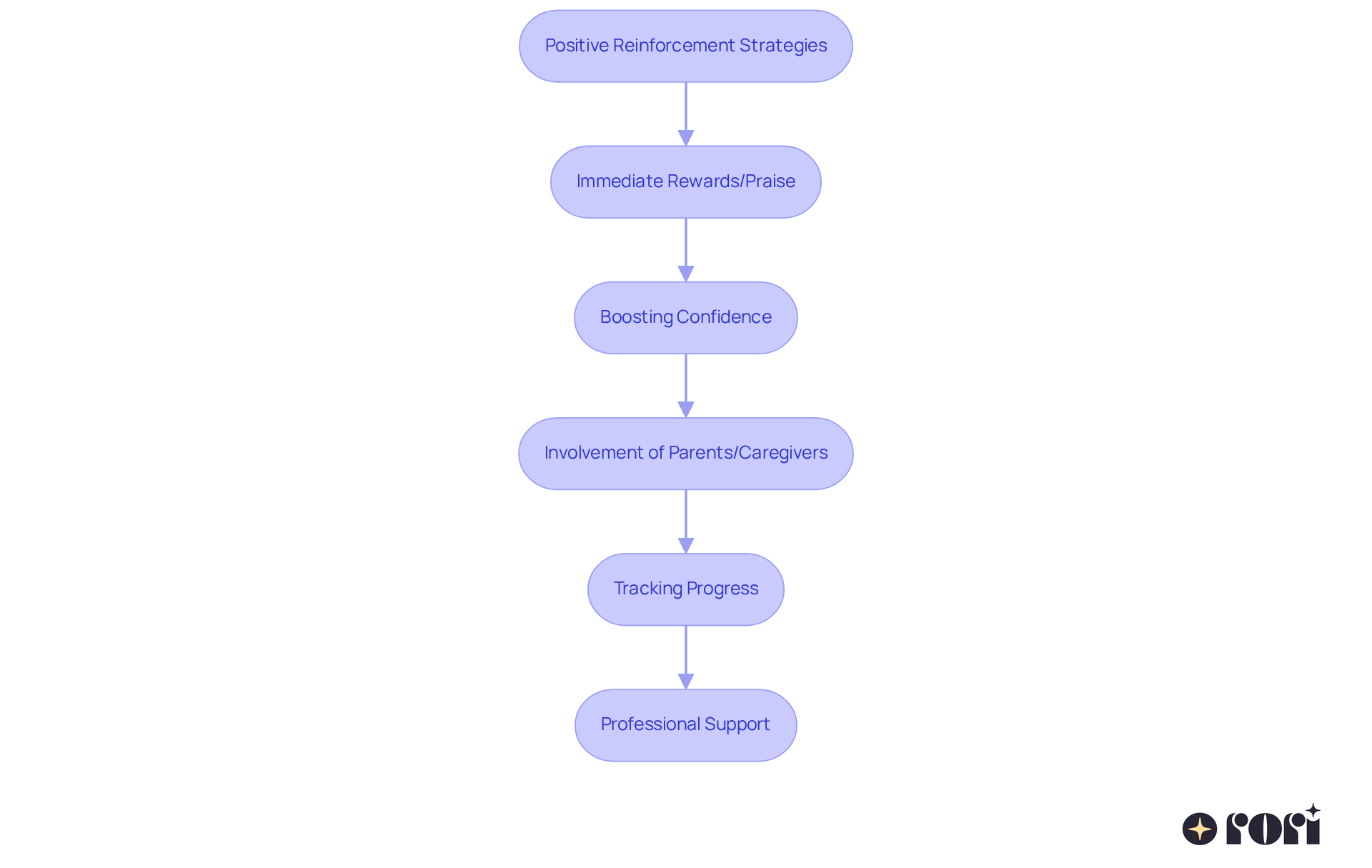
Visual supports like picture schedules, narratives, and visual cues are super helpful for kids with autism as they navigate social expectations and interactions, especially when applying ABA strategies for social skills in public places. This program is particularly beneficial for children with Autism Spectrum Disorders, ADHD, Communication Disorders, and Anxiety Disorders by implementing ABA strategies for social skills in public places, which boost their social skills and confidence. Research shows that ABA strategies for social skills in public places can really help reduce anxiety and increase engagement during social gatherings. For instance, a visual schedule helps a young person anticipate what’s coming next, creating a sense of predictability and comfort.
Parents can easily create visual tools that break down the steps involved in social interactions, empowering their kids to face tricky situations with confidence. By getting involved in their child’s learning-such as collecting data and aligning strategies-parents can implement ABA strategies for social skills in public places to build a consistent and supportive environment that maximizes the benefits of these interventions. Educators have noticed that using visual aids, in conjunction with ABA strategies for social skills in public places, not only helps with communication but also nurtures essential social skills, allowing kids to express themselves better and connect with their peers in meaningful ways.
To get started with visual aids, parents might want to develop a simple visual timetable for daily tasks. This can help their child understand what to expect and ease any stress in social situations. Let’s explore this together! We’re here to help you every step of the way!
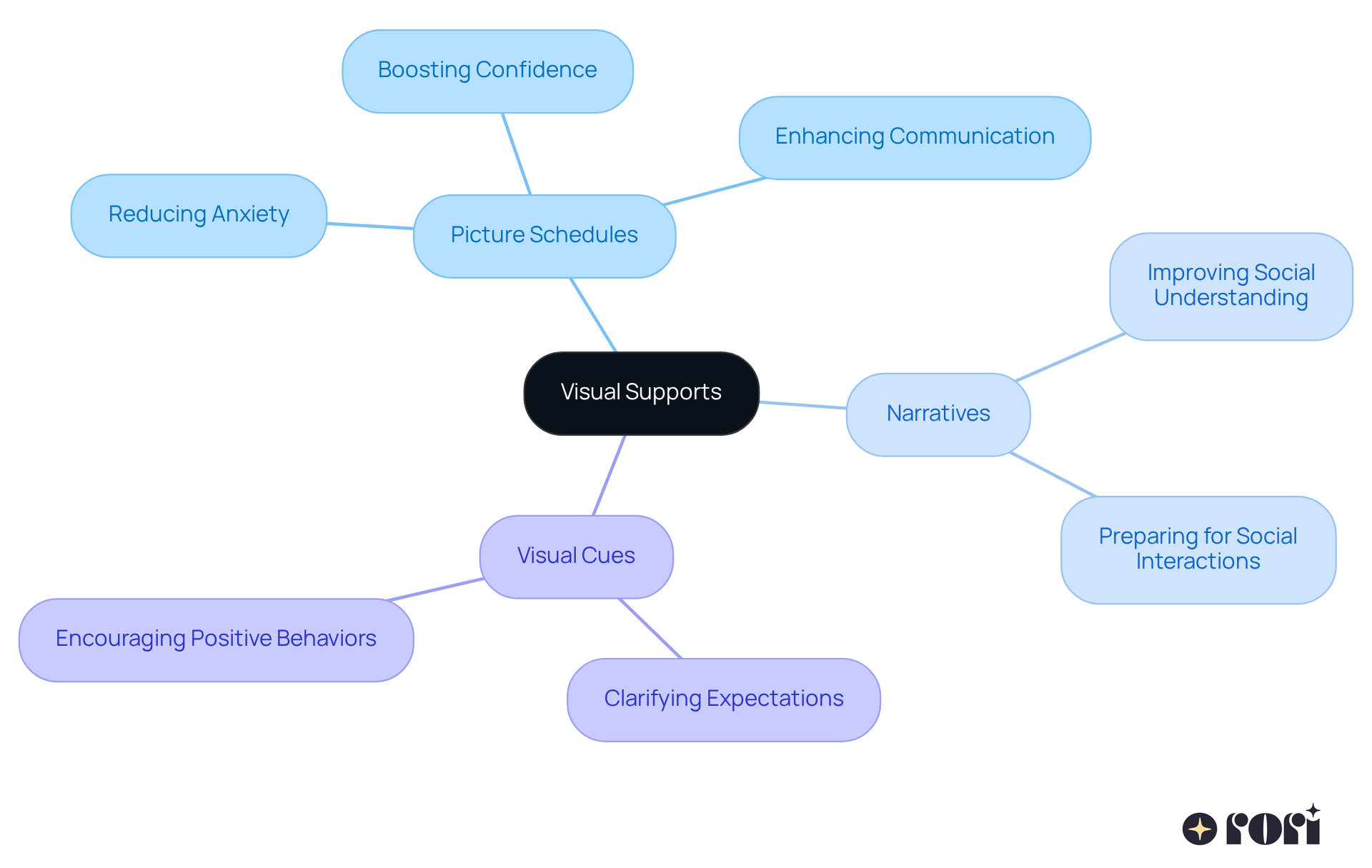
Social stories are like little guides that help kids understand social situations and the behaviors expected in them. By sharing what children can expect in different public settings - like dining at a restaurant or celebrating a birthday - parents can really boost their kids' understanding of social cues and appropriate responses.
For instance, a story about waiting in line can teach kids about patience and taking turns, which can help ease any anxiety they might feel in those situations. Recent studies show that using narratives is a fantastic way to strengthen connections for kids with autism spectrum disorder (ASD), highlighting how these stories can enhance their understanding and participation in social settings.
As kids learn to navigate these scenarios through structured stories, they become more equipped to handle real-life interactions, which ultimately builds their confidence and social skills. This journey is even more effective when caregivers actively participate, as they can support their child's development with the right tools and knowledge.
So, how can parents create effective social stories? Here are a couple of simple steps:
This approach not only fosters social skills but also demonstrates Rori Care's commitment to neurodiversity and the success of every young person by implementing ABA strategies for social skills in public places. It's important to note that when recommended hours of ABA strategies for social skills in public places are fully utilized with active caregiver involvement, 90% of young individuals show significant improvement. Plus, ABA therapy is the only scientifically backed treatment for autism that insurance covers.
Let’s explore this together! We’re here to help you every step of the way!

Role-playing is such a fantastic way for kids to practice social situations in a safe and controlled environment, utilizing ABA strategies for social skills in public places. This personalized therapy is rooted in the science of learning and behavior, adapting to each child's unique needs. Imagine your child acting out scenarios like introducing themselves to a new friend or asking for help in a store - these realistic role-play situations mirror their daily experiences. Not only does this practice introduce kids to social norms, but it also helps ease anxiety in public situations by utilizing ABA strategies for social skills in public places. Research shows that role-playing can effectively reduce anxiety in social interactions, giving kids the confidence to engage more freely.
But the benefits of role-playing go beyond just getting familiar with social cues; it actively boosts kids' interpersonal skills. When they participate in these activities, they learn to read and navigate social signals, which enhances their ability to communicate effectively. Development experts emphasize that engaging in role-play scenarios, which are part of ABA strategies for social skills in public places, equips kids with the skills they need to handle real-life encounters, ultimately leading to greater confidence in social settings.
Role-playing is especially beneficial for children with autism, providing a structured way to explore social dynamics. By practicing different interactions, kids learn to express their thoughts and respond to others, which is crucial for building connections. This approach utilizes ABA strategies for social skills in public places, which not only helps develop essential social skills but also fosters emotional regulation, enabling kids to tackle social challenges more adeptly.
Incorporating role-playing into daily routines can truly change how kids view and engage in social situations, which is essential when applying ABA strategies for social skills in public places in autism therapy. As they practice these scenarios, they gain the confidence to navigate school, family gatherings, and friendships, setting them up for success in life. Plus, caregivers can boost the effectiveness of role-playing by tracking their child's progress, a key aspect of ABA. By equipping caregivers with ABA principles and strategies like role-playing, Rori Care - ABA Therapy supports families in overcoming challenges and nurturing growth with expertise and compassion. Let’s explore this together!
Organized playdates can be a game changer for kids with autism! They really help boost communication and skill development. When parents set up activities that focus on sharing, turn-taking, and chatting, it creates a fantastic learning environment. Think about games that require teamwork; they not only promote collaboration but also sharpen problem-solving skills.
Research shows that kids who join organized playdates often see big improvements in their abilities. Engaging with peers can lead to better emotional regulation and communication skills. Child psychologists emphasize that these interactions are key for building empathy and understanding social cues, which are so important for lasting friendships.
Plus, group therapy for interpersonal skills, led by trained therapists at Rori Care, can take these interactions to the next level. It helps kids improve their communication and relationships in a supportive group setting. By thoughtfully organizing playdates and choosing companions who are familiar, empathetic, and patient, parents can help their kids navigate social interactions more smoothly.
And let’s not forget about caregiver education! Rori Care provides parents with valuable ABA strategies for social skills in public places, such as reinforcement techniques and data collection methods. This empowers parents to actively support their child’s behavioral goals with informed choices. It’s all about fostering growth and confidence during those crucial preschool years. Let’s explore this together!
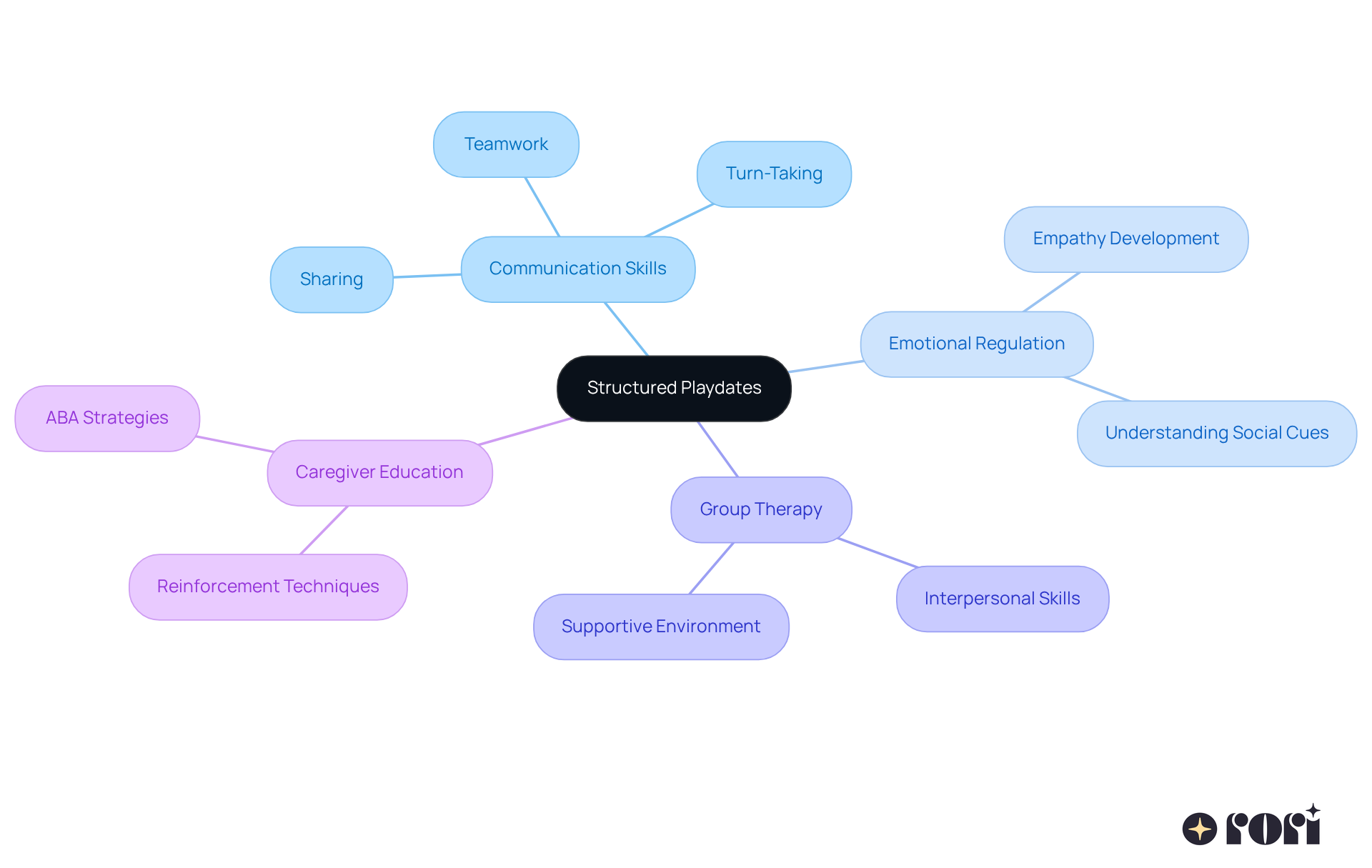
Prompting methods are essential tools for implementing ABA strategies for social skills in public places to assist kids with autism in engaging. Parents can use different types of prompts to support their children. For instance, verbal prompts can remind kids to say 'thank you' after receiving help. Visual prompts, like showing a picture of a friend, can encourage interaction. And then there are model prompts, where parents demonstrate the behavior they want to see.
Research shows that these strategies can significantly boost kids' interactions, helping them navigate social situations with more confidence. In fact, when the recommended hours of ABA therapy are fully implemented with active caregiver involvement, about 90% of kids show remarkable improvement. By using ABA strategies for social skills in public places, parents can guide their children through various social scenarios, building essential skills and a sense of competence.
This approach not only aids in skill development but also nurtures emotional resilience, allowing young people to connect meaningfully with others. As behavior analysts often say, "Prompting is a pathway to confidence, independence, and connection for individuals with autism." Plus, the active role of caregivers in applying these strategies is crucial. It aligns with ABA strategies for social skills in public places, ensuring that support is tailored to each child's unique abilities and goals.
Empowering caregivers through education enhances their ability to make informed choices, leading to better behavioral outcomes and a more supportive environment for their children's growth. And let's not forget, ABA therapy is the only scientifically proven treatment for autism that insurance covers.
So, let’s explore this together! Your involvement can make a world of difference!

Generalization of abilities is all about how kids can use their social skills in different places, which includes implementing ABA strategies for social skills in public places like home, school, and the community. Parents play a crucial role in this journey by encouraging their kids to practice these skills in various situations. For example, if your child learns to say hello to friends at school, you can help reinforce this by prompting similar greetings at the park or during family gatherings. This kind of consistency not only strengthens their social skills but also helps them become more independent.
Recent studies really highlight how important it is for kids to develop these skills in different settings. Research shows that children who can generalize their abilities tend to feel more confident and adaptable, which are key traits for thriving in everyday life. Fun methods like role-playing and video modeling are effective tools in applying ABA strategies for social skills in public places, helping kids recognize and respond to social cues in various situations.
Educators emphasize that being able to use learned techniques in real-life scenarios is vital for successful outcomes. Parents can enhance their children's ability to navigate social interactions with ease by implementing ABA strategies for social skills in public places through creating chances for practice outside of structured environments. This collaborative approach between parents and therapists ensures that kids are ready to apply their skills seamlessly in daily activities, leading to meaningful social engagement.
Let’s explore this together! By supporting our kids in practicing their social skills, we’re not just helping them learn; we’re also building their confidence and independence. So, what are some ways you can encourage your child to practice these skills in your everyday life? We’re here to help you every step of the way!
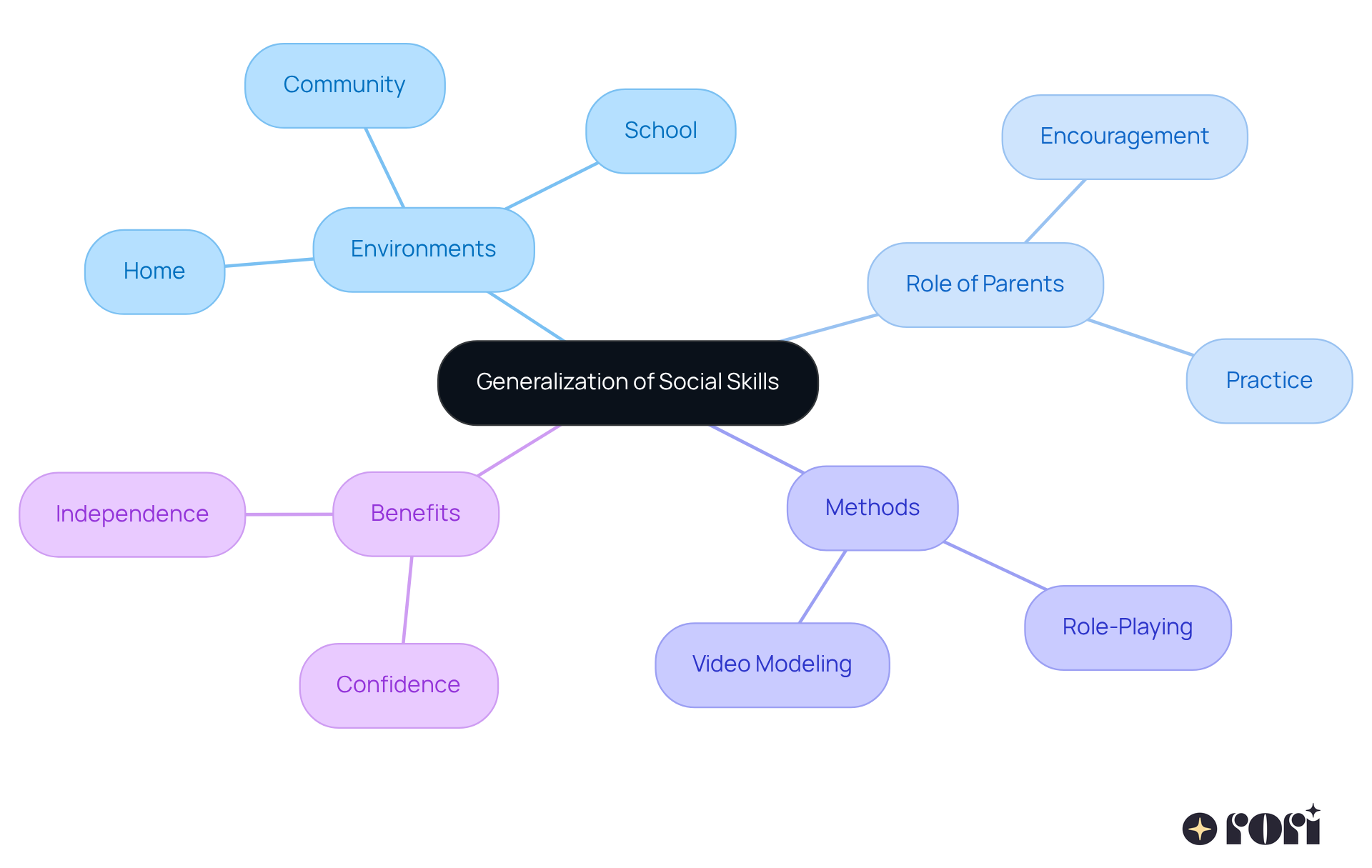
Active parental involvement is so important for helping kids build their interpersonal skills, both at home and out in the world. When parents join caregiver education programs, they gain a better grasp of ABA strategies for social skills in public places and principles. This knowledge empowers them to support their kids effectively.
With this understanding, parents can create opportunities for their children to interact. Think about:
Research shows that when parents are involved, kids' interactions and emotional growth really take off, leading to more prosocial behaviors.
Family therapists often point out that engaged parents help youth achieve better relational outcomes. Parental support is a vital resource for navigating social challenges. By consistently reinforcing the skills learned in therapy and making informed choices, parents can apply ABA strategies for social skills in public places to help their kids internalize these behaviors. This boosts the chances of positive interactions in group settings.
This collaborative approach not only fosters a nurturing environment for social development but also allows parents to be active participants in their children's growth journey. To make this process even better, parents are encouraged to keep in touch with their child's therapists. This way, they can align strategies and ensure skills are reinforced consistently across different settings.
Let’s explore this together! We’re here to help you every step of the way!
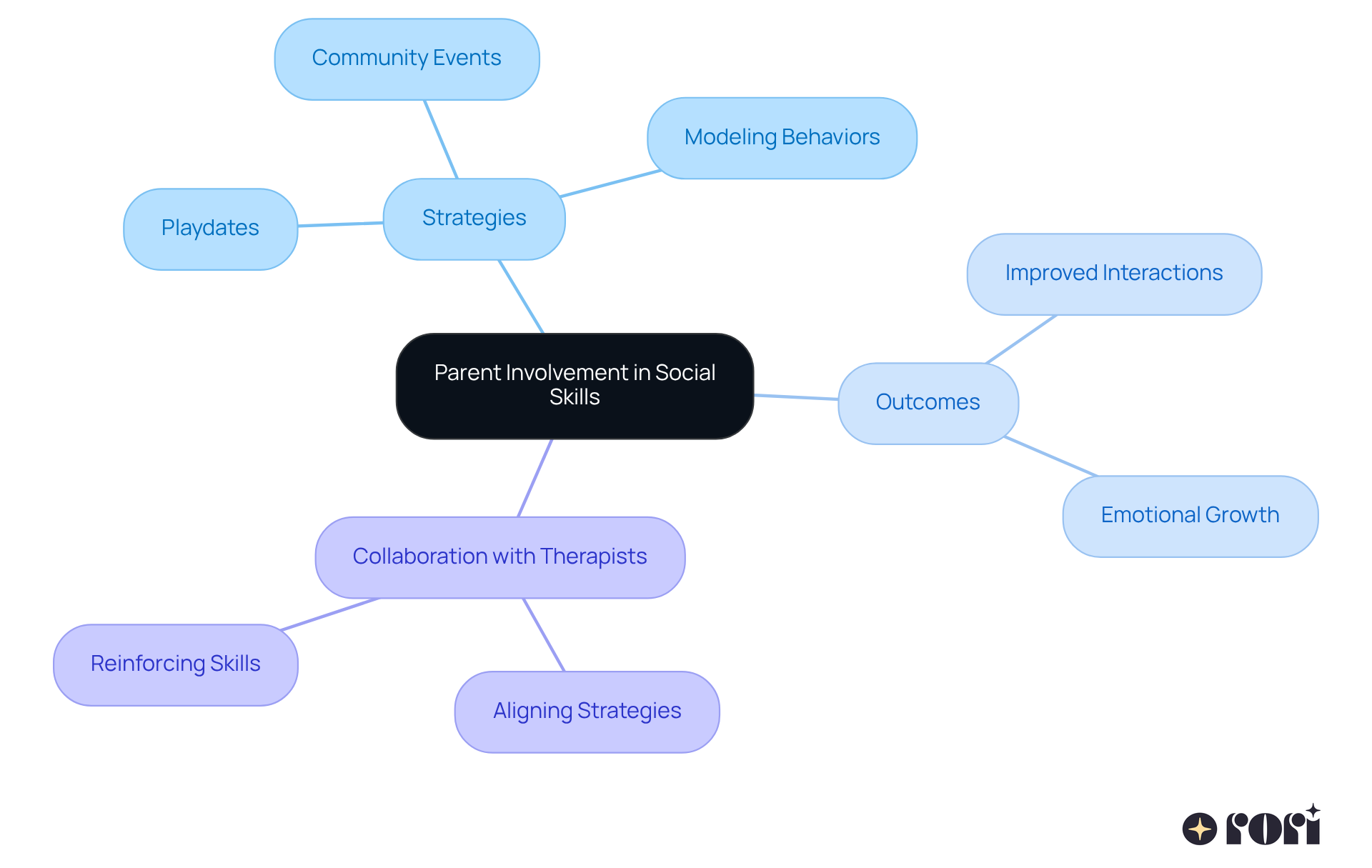
Building social skills in children, especially those with autism, is quite the journey! It takes dedication and the right strategies to make a real difference. This article shares some effective ABA strategies for social skills in public places, highlighting how personalized interventions can cater to each child's unique needs. By using these strategies, parents can really boost their children's confidence and ability to interact positively in various social settings.
Key insights from the article show just how effective techniques like:
can be. Each of these approaches creates a solid support system that not only helps develop social skills but also nurtures emotional resilience. And let’s not forget the crucial role of active parental involvement! It reinforces learning and helps children apply their skills in real-world situations.
Ultimately, developing social skills is a team effort involving parents, therapists, and the child. By embracing these ABA strategies for social skills in public places, families can create an environment that encourages growth, confidence, and meaningful connections. Engaging actively in this process not only equips children with essential skills but also empowers parents to play a pivotal role in their children's social development. Committing to fostering these skills today truly paves the way for brighter, more connected futures for children navigating the complexities of social interactions.
Let’s explore this together! We’re here to help you every step of the way!
What is Rori Care's approach to ABA therapy?
Rori Care uses a data-driven approach that incorporates AI technology to automate progress report generation, allowing clinicians to spend 50% more time on direct treatment and provide personalized strategies for each young patient.
How does Rori Care assess the needs of children with autism?
Skilled behavior analysts conduct thorough assessments to identify the unique challenges faced by kids with autism, enabling the creation of focused interventions using ABA strategies for social skills.
What benefits does early and intensive ABA therapy provide?
Research indicates that early and intensive ABA therapy can lead to significant improvements in communication and social skills, with 47% of individuals receiving therapy becoming indistinguishable from their peers.
How does parental modeling influence children's social interactions?
Parental modeling allows children to see and mimic appropriate social responses in real-time, which helps them learn important skills like greetings and sharing, ultimately enhancing their confidence in group settings.
What role does positive reinforcement play in teaching social behaviors?
Positive reinforcement involves providing immediate rewards or praise after a desired behavior, which encourages that behavior to occur again and boosts the child's confidence in social interactions.
How can parents and caregivers support their child's ABA therapy?
Parents and caregivers can get involved by practicing new skills in everyday situations and using ABA strategies consistently to reinforce learning, which enhances the child's social development.
What should caregivers do to track their child's progress in ABA therapy?
Caregivers should maintain a simple log of behaviors and rewards to monitor improvements over time and adjust strategies as needed.
Who delivers ABA therapy at Rori Care?
ABA therapy at Rori Care is delivered by trained professionals, including Board Certified Behavior Analysts (BCBAs) and Registered Behavior Technicians (RBTs), who apply evidence-based strategies tailored to each child's unique needs.